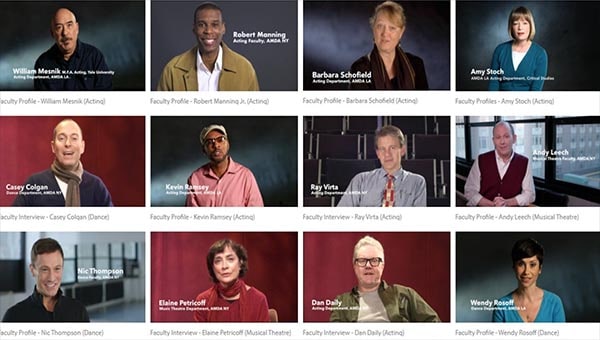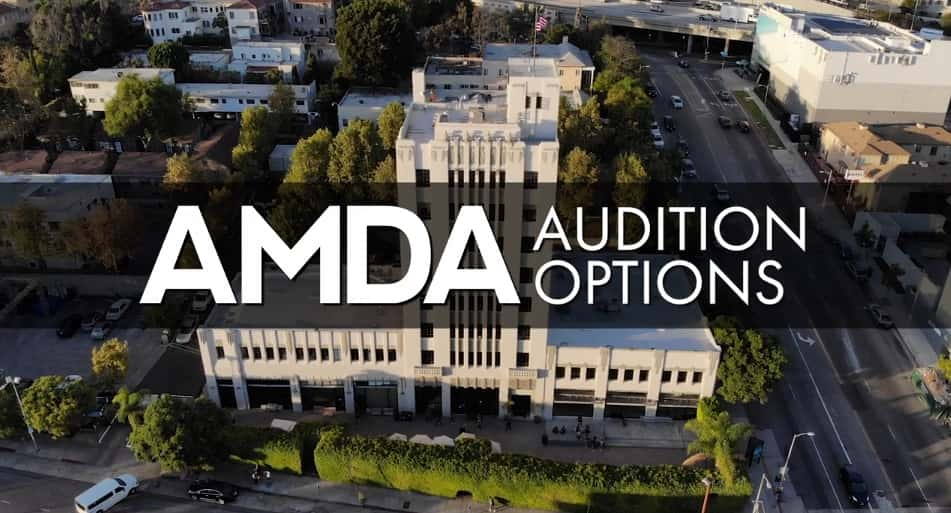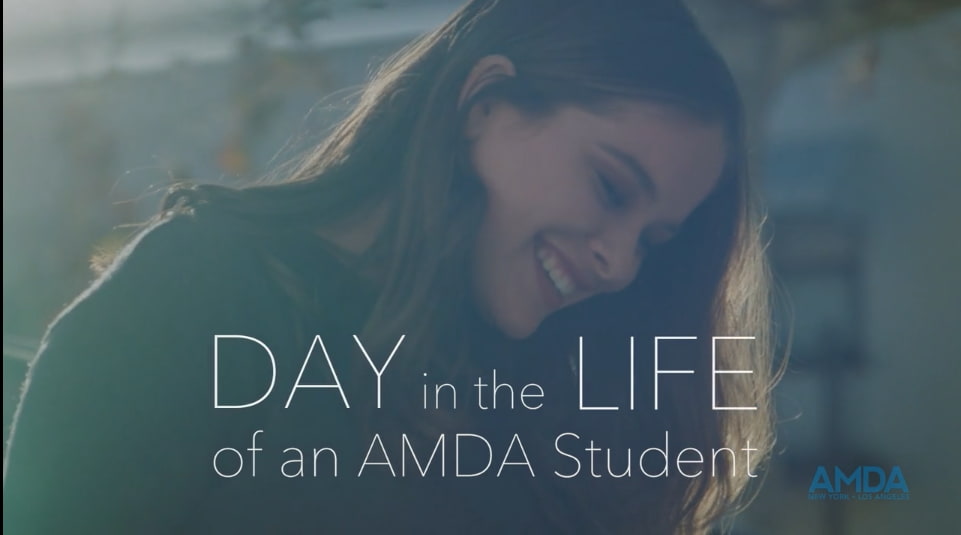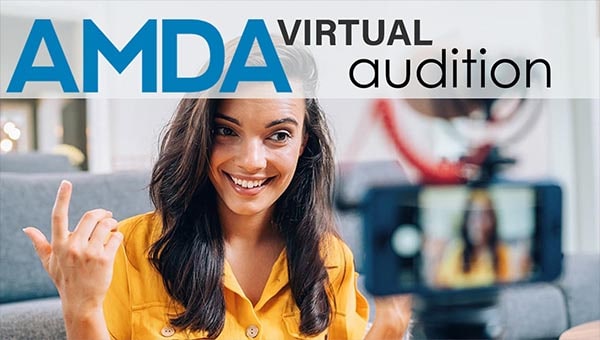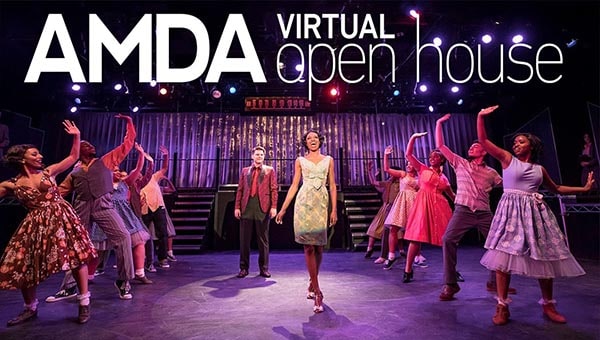Accessibility Services
The mission of AMDA's Accessibility Services Office is to ensure that all students are afforded an equal opportunity to fully participate in and benefit from AMDA's performing arts education and diverse community of creative artists. We believe that disability is an integral part of the diversity of experience that fuels creative excellence. Therefore, it is our goal to remove access barriers to allow every student to reach their fullest potential.
To contact Accessibility Services, please call (646) 823-5297 (Hannah) or (347) 266-9428 (Avery), email LAAccessibility@amda.edu or
NYAccessibility@amda.edu, or, on the LA campus, visit us on the 8th floor of Tower.
About the Office
Accessibility Services provides support, advocacy, resources, and accommodation assessment for students with disabilities.
A person with a disability, as defined by the ADA, is someone with ‘a physical or mental impairment that substantially limits one or more major life activities’. If you feel as though you have an impairment that impacts your ability to access your classes, your residence hall, or any other AMDA program or service, Accessibility Services is here to help.
Accessibility Services strives for full accessibility and inclusion for all students. Whether or not you identify as disabled, we want to hear from you if you notice ways in which AMDA can improve. You may email Accessibility Services or leave feedback for us using the following form.
Accessibility Services Staff
Services
-
Students +−
- Assessment of eligibility for disability accommodations, including both classroom and
residential accommodations
- Tips, resources, and strategies to manage any difficulties that may not rise to the level of
requiring official accommodations
- Staff support for student-led alliances surrounding disability rights, awareness, support,
and/or advocacy
- Assistance with developing self-advocacy skills and communicating with instructors and peers
- Assistance for disabled students within other AMDA meetings where extra support, presence, or
advocacy may be needed
- Help finding local resources to utilize after graduation from AMDA
-
Faculty/Staff +−
- Regular trainings and professional development opportunities to ensure that faculty and staff
have the tools to teach inclusively
- One-on-one assistance with effectively incorporating student needs into unique courses and
teaching styles
- Information to reference on the Faculty Dashboard including FAQs, communication tips, resources
for universal design, and a changing library of videos including performances involving disabled
performers and talks by disabled panelists/speakers
- Consultation regarding incorporating the needs of disabled students into curricula, programs,
events, performances, and other AMDA programming
Accommodations Request Process
If you are a student with a disability and feel as though accommodations are needed for you to enjoy equal access to AMDA’s programs or services, Accessibility Services is here to support you.
Step 1: Submit Request
Please use this form to request accommodations. The form will ask you to describe in your own words your disability and any barriers you are experiencing or anticipate experiencing at AMDA. It also asks you what reasonable accommodations you feel will best remove those barriers. Please be as detailed as possible, as this helps us approve the accommodation(s) that best provide equal access. If you don’t know for sure what accommodations you need, that is fine. Suggest any ideas you have, and specific accommodations will be discussed with you in your access meeting.
You will be required to upload supporting documentation within your request form. We recommend that you have your treating professional fill out our Disability Information Form and then submit that. If you already have other documentation, or your provider prefers to use their own form, that is fine, but please ensure that the documentation you submit is from a healthcare professional who is licensed to diagnose and treat your condition, is treating you for your condition, AND includes ALL of the same information as is asked for in the form. More detailed information about documentation requirements is included in the Disability Accommodations Policy.
Step 2: Access Meeting
After you have completed the request form and submitted your supporting documentation, Accessibility Services will reach out to schedule an Access Meeting. During this meeting, we will engage in what is called the interactive process, where we will discuss your individual situation and needs so we are able to determine what accommodations are appropriate. Your accommodations will be officially determined shortly after this meeting. Note that while Accessibility Services may confer or inquire with other staff in general terms in order to thoroughly explore all accommodation options, the office will NOT share your diagnosis or information from your documentation with anyone unless you expressly give us permission to do so.
More information about the accommodations process can be found in our Disability Accommodations Policy.
Emotional Support Animal Request Process
To request to bring an emotional support animal (ESA) to live with you in the residence halls, please fill out the same form as you would if you were requesting accommodations, but ensure that the supporting documentation you upload is the ESA Verification Form.
Before you start the process of requesting an ESA, please make sure you have read AMDA’s full Emotional Support Animal Policy and Procedures
Frequently Asked Questions
FAQs for students
-
WHAT IS A DISABILITY? HOW DO I KNOW IF WHAT I HAVE IS A DISABILITY? +−
AMDA follows the definition of the ADA (Americans with Disabilities Act), which defines a disability as 'a physical or mental impairment that substantially limits one or more major life activities'. It can mean visual or hearing impairments, using a wheelchair or crutches to get around, processing information more slowly, having difficulty maintaining focus, or any number of other limitations. If you are not sure whether you have a disability, you are welcome to come into Accessibility Services to discuss your individual situation.
-
DO I NEED TO HAVE DOCUMENTATION OF MY DISABILITY TO GET HELP FROM ACCESSIBILITY SERVICES? +−
No. You do need documentation of your disability to request official disability accommodations, but Accessibility Services is able to support you in other ways if you do not have documentation. We are can help you with practicing self-advocacy and communication skills, recognizing and building your strengths, developing strategies for issues you may be struggling with, understanding your rights under the ADA, finding local resources, and more./p>
-
IF I SUBMIT DOCUMENTATION FOR AN ACCOMMODATION REQUEST, AM I GUARANTEED THAT ACCOMMODATION? +−
No. Submitting documentation gives us the information we need in order to assess your request, but it doesn’t guarantee that your desired accommodation will be granted. However, if we identify a barrier to access, we will ensure that it is addressed through another reasonable and appropriate accommodation.
-
I RECEIVED ACCOMMODATIONS IN HIGH SCHOOL FOR A DISABILITY. DOES IT WORK THE SAME WAY IN COLLEGE? +−
No. If you received accommodations in high school, you may notice that accommodations work differently in college. In college, you are responsible for self- identifying to Accessibility Services, providing documentation of your disability, and requesting accommodations. Accessibility Services will not seek you out unless you choose to self-identify.
In addition, the accommodations you are eligible to receive are different. In high school, you may have been entitled to modifications of the curriculum; that is, you may have received individually designed instruction, been allowed to demonstrate different types of skills, or been given alternate assignments.
Colleges, conversely, do NOT modify curricula or program outcomes; all students must be able to demonstrate the same knowledge, skills, and proficiencies in order to receive a degree or certificate. This means that you will still be learning, developing, and demonstrating the same course and learning outcomes as your peers.
-
WHAT IF I DID POORLY ON AN EXAM OR PERFORMANCE, OR HAD POOR ATTENDANCE DUE TO A DISABILITY? IF I REQUEST ACCOMMODATIONS AFTERWARD, CAN YOU DO ANYTHING ABOUT THAT? +−
Unfortunately, no. Accommodations cannot be made retroactively. To avoid this type of situation, it is in your best interest to request any needed accommodations as soon as possible after becoming aware of your disability.
-
IF YOU APPROVE ME FOR ACCOMMODATIONS, WILL YOU TELL MY INSTRUCTORS ABOUT MY DISABILITY? WILL MY ACCOMMODATIONS APPEAR ON MY TRANSCRIPT? +−
No, and no. All information you submit to us for consideration of an accommodation request is kept confidential. The letter we send to your instructors includes only the accommodations to which you are entitled, and does not include specific information about your condition. It is your choice whether you want to disclose your disability to your instructors (or anyone else). The fact that you had accommodations will not appear anywhere on your academic record.
-
WHAT IF MY INSTRUCTOR DOES NOT GIVE ME THE ACCOMMODATIONS YOU APPROVED ME FOR, OR TREATS ME DIFFERENTLY BECAUSE OF MY ACCOMMODATIONS REQUEST? +−
If this occurs, notify Accessibility Services ASAP. We will address the matter with the instructor. In the event that the instructor has concerns about fundamental alteration of learning outcomes, we will ensure that you receive the accommodations for which you were approved until a final decision is made.
-
HOW DO ACCOMMODATIONS WORK IN A PERFORMANCE-BASED SETTING, ANYWAY? +−
Great question! Many of the common college accommodations you've probably heard of (extra time on tests, having a note-taker, the use of a computer for essay-writing, etc) may not apply to classes where grades are determined largely by performance. That means we at AMDA – both you and Accessibility Services – have the opportunity to get creative! Your AMDA education is unique because of its emphasis on rigorous performance-based training and an industry-focused experience, so why shouldn't your accommodations be unique too?
YOU are the person who knows the particulars of your situation the best, so when you meet with Accessibility Services, we will take your feedback and suggestions into account when determining accommodations. The point of accommodations is to ensure you are on a level playing field with your peers – not at an advantage or a disadvantage. If together we can come up with an accommodation that meets this definition, doesn't alter the learning outcomes of your course or program, doesn't constitute an undue burden on your instructor, and doesn't impact the educational experience of other students, then we will have succeeded.
To contact Accessibility Services, please call (646) 823-5297 (Hannah) or (347) 266-9428 (Avery), email LAAccessibility@amda.edu or
NYAccessibility@amda.edu, or, on the LA campus, visit us on the 8th floor of Tower.








